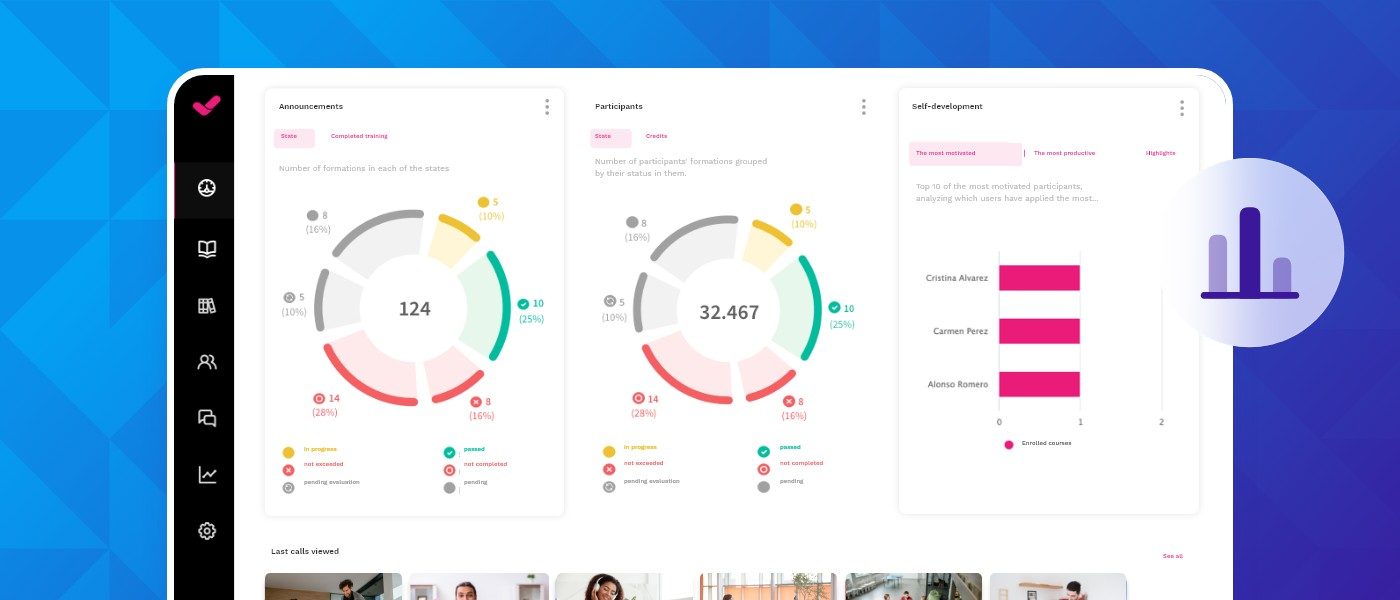Table of contents
ToggleEngagement is one of the biggest roadblocks to successful training. In a workforce that’s accustomed to an increasingly rapid pace of life with immediate access to content, attracting and keeping the attention of employees is a challenge faced by all training managers.
In fact, the average attention span in 2022 was just 8 seconds, down from 12 seconds in the year 2000. But what can companies do to tackle low levels of engagement and reach their training objectives? The secret lies in learning assessments.
Why is it important to evaluate training?
Evaluating the success of your training program involves monitoring its progress and identifying areas for improvement. It allows you to see which parts of your content are working and which aren’t based on different metrics and demographics related to users, sessions, media, and beyond.
First and foremost, the evaluation of training is essential for measuring progress towards your training objectives. A well-considered training plan should be based around a set of goals that determine whether or not your program is successful and measuring your results against them is essential to see what value you are offering to your employees and the company as a whole.
It’s also useful for tackling common challenges in the learning and development industry like learner engagement; by monitoring your analytics you can see where these challenges are most prominent and in doing so, develop a plan to tackle them, make necessary improvements to your training, and improve your ROI (Return on Investment).
How can an LMS help you to evaluate training?
But how can you evaluate the results of your training? There are various online tools which provide statistics and reports on your e-learning content. You can also include evaluations like self-assessments within the content itself.
A Learning Mangement System (LMS) can be incredibly valuable when it comes to diving deep into the effectiveness of your training. With this software, you can create, deliver, manage, and evaluate your training in a single online platform. Its evaluation capabilities are particularly extensive, allowing you to download reports that cover a wide range of variables and demographics.
isEazy LMS for example, features a dedicated module for reports and evaluations that allows both administrators and tutors to export and download data by user, session, geographical area, and beyond. Below we explore some of the metrics you can evaluate in more detail and how they can help you to improve the training you offer.
Key metrics and indicators for a successful learning evaluation
Through the Business Intelligence Module in isEazyLMS, you can export and download a huge amount of data relating to the performance of both your content and learners.
- Access and navigation: This section gives you access to unique users, navigation time, and a map of sessions according to country, as well as the most used search engines. It’s an ideal starting point evaluate training as a whole before diving deeper into the specifics.
- Users: This module is helpful for tackling challenges related to learners. Here you can see the number of users, their progress and participation, and the status of their training (completed, in progress, pending etc.) among other metrics. This helps you to evaluate learning at a more human level and focus on the professional development of your employees.
- Training data: In this dashboard, you’ll find information on the activities within your training such as grades, sessions, hours, and rankings. Using this global vision, you can see in which areas you need to focus your attention. If one activity, for example, is seeing lower grades across the board, it could be time to evaluate it.
- Knowledge management: This area focuses even more closely on the content, offering analysis of images, videos, and other items in your content library. Here you can also access data on downloads, favorites, likes and other social rankings to help you understand which content resonates most with your audience and which pieces you need to work on.
Practical advice for improving your training based on your training evaluation
- Now you understand some of the key metrics to consider, the first step to improving your training is evaluating them. Download the reports that apply to your training program and involve the relevant stakeholders in the process.
- Next, use these results to identify areas for improvement based on the parts of your training with the least interactions and engagement. Make a note of how different factors influence these results too, from location to the devices used. You can dive deeper into the reasons behind these results by asking for feedback from users.
- Use the metrics, in combination with the feedback you receive, to make changes and improvements to your training. At this point, you can also consider the latest trends in e-learning to really optimize your content and make sure it’s delivered in a way that resonates with modern learners. Microlearning, gamification and personalization of training are just a few examples.
- Last but not least, it’s important to encourage ongoing feedback in relation to your training. Be sure to communicate the values of likes, saves, comments, and reviews to your employees and commit to a process of continuous improvement with their opinion at the center.
Evaluate training easily and efficiently with isEazy LMS
Discover isEazy LMS’ Business Intelligence Module and explore all the metrics you need to carry out a thorough learning assessment and take your training to the next level. Analytics are presented in a visual, user-friendly way that makes it easy to evaluate training and optimize your content based on data by person, department, geographic area, or company. Try it for free.













